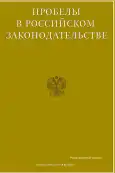От полиграфа до новых технологий, выявления лжесвидетельства при производстве по уголовному делу
- Авторы: Волосова Н.Ю.1
-
Учреждения:
- Оренбургский государственный университет
- Выпуск: Том 15, № 5 (2022)
- Страницы: 342-348
- Раздел: Статьи
- URL: https://journal-vniispk.ru/2072-3164/article/view/147642
- ID: 147642
Цитировать
Аннотация
Полный текст
Открыть статью на сайте журналаОб авторах
Нонна Юрьевна Волосова
Оренбургский государственный университет
Email: vasilii_vasiliev@rambler.ru
д-р юрид. наук, доцент, заведующий кафедрой уголовного права Оренбург, Российская Федерация
Список литературы
- Белкин А.Р. Допустимость, достоверность, процессуальная пригодность, или Еще раз о роли полиграфа в уголовном судопроизводстве / А.Р. Белкин // Уголовное судопроизводство. - 2013. - N 2. - С. 14 - 20.
- Букаев Н.М. Полиграф и гипноз: проблемы применения в уголовном процессе России // Совершенствование деятельности правоохранительных органов по борьбе с преступностью в современных условиях: материалы Всероссийской научно-практической конференции (26 - 27 октября 2006 г.). - Тюмень, 2007. - Вып. 3. - С. 153.
- Васюков И. Г. Использование заключения психофизиологической «экспертизы» в качестве доказательства в уголовном процессе. [Электронный ресурс]. - URL: https://pravorub.ruarticles/31867.html (дата обращения: 19.04.19).
- Гладышева О.В., Челяпина Н.Н. Доказательственное значение психофизиологического исследования // Актуальные проблемы специальных психофизиологических исследований и перспективы их использования в борьбе с преступностью и подборе кадров: сб. материалов IX Междунар. на-уч.-практ. конф. - Сочи: Кубанский гос. политех. ун-т, 2008. - С. 124-129.
- Дамаскин О.Н., Полубинская С.В. Правовые аспекты использования полиграфа / О.Н. Дамаскин, С.В. Полубинская // Союз криминалистов и криминологов. - 2019. - № 1. - С. 7-13
- Игнатьева И.Ю. О практике использования методики оценки внимания при производстве психофизиологических экспертиз и исследований с использованием полиграфа // Комплексная психолого-психофизиологическая экспертиза: современное состояние и перспективы развития: сб. ст. Международной научно-практической конференции. - Калуга, 2016. - С. 106-111
- Конституционно-правовые проблемы использования полиграфа в уголовном процессе. Протокол заседания научно-экспертного совета при комитете по конституционному законодательству Совета Федерации от 29 марта 2011 г. - URL: http://www.e-xecutive.ru/ blog/Legality/9863.php.
- Колоколов Н.А. Полиграф Полиграфович / Н.А. Колоколов // Вестник Московского университета МВД России. - 2016. - №8. - С. 111-113
- Комиссарова Я.В., Хамзин С.Р. Практика использования полиграфа в уголовном судопроизводстве России / Я.В. Комиссарова, С.Р. Хамзин // Библиотека криминалиста. Научный журнал. - 2017. - № 6. - С. 363-371
- Корухов Ю.Г. Криминалистическая диагностика при расследовании преступлений: науч.-практ. пособие. - М.: НОРМА-ИНФРА-М, 1998. - 283 с.
- Криминалистика : Учеб. для вузов / Т. В. Аверьянова, Р. С. Белкин, Ю. Г. Корухов, Е. Р. Россинская; Под ред. Р. С. Белкина. - М. : Издат. группа НОРМА - ИНФРА-М, 1999. - 971 с.
- Определение Верховного Суда РФ от 22.04.2010 № 77-О10-10 [документ опубликован не был] // СПС «КонсультантПлюс»
- Определение Верховного Суда РФ от 08.02.2011 № 72-О11-3 [документ опубликован не был] // СПС «КонсультантПлюс»
- Обзор кассационной практики судебной коллегии по уголовным делам Верховного Суда Российской Федерации за второе полугодие 2012 года: утв. Президиумом Верховного Суда РФ 03.04.2013; Определение Верховного Суда РФ от 04.10.2012 № 34-О12-12 // СПС «КонсультантПлюс»
- Об организации производства судебных экспертиз в экспертных подразделениях органов Федеральной службы безопасности: приказ ФСБ РФ от 23 июня 2011 г. № 277 ( в ред. от 4.12.2017 г.) // СПС «КонсультантПлюс»
- Пособие для следователя. Расследование преступлений повышенной общественной опасности / Бабаева Э.У., Гайдук А.П., Дворкин А.И., Касьяненко В.П., и др.; Науч. ред.: Дворкин А.И., Селиванов Н.А.; Отв. за вып.: Завидов Б.Д., Перевертов В.А., Румянцев В.Н. - М.: Лига Разум, 1998. - 444 c.
- Семенцов В.А. Новое следственное действие - проверка показаний на полиграфе / В.А. Семенцов // Российский юридический журнал. - 2010. - № 5. - С. 132-137
- Ушаков А.Ю., Андриянова О.Ю. Использование результатов психофизиологических исследований с помощью полиграфа в раскрытии и расследовании уголовных дел: монография / А.Ю. Ушаков, О.Ю. Андриянова ; ред. А.В. Пчелкин. - Н. Новгород : НА МВД России, 2014. - 83 с.
- Холодный Ю.И. Трудности на пути внедрения в практику экспертизы с применением полиграфа / Ю.И. Холодный // Вестник Академии экономической безопасности МВД России. - 2010. - № 5. - С. 109-112
- Холодный Ю.И. Применение полиграфа при расследовании преступлений коррупционной направленности // Взаимодействие органов государственной власти при расследовании преступлений коррупционной направленности: проблемы и пути их решения: материалы Международной научно-практической конференции, посвященной 100-летию со дня рождения выдающегося российского ученого Николая Сергеевича Алексеева (г. Москва, 23 октября 2014 года). - М., 2014. - С. 327 - 329.
- Emotional Entanglement: China’s emotion recognition market and its implications for human rights URL: https://www.article19.org/wp-content/uploads/2021/01/ER-Tech-China-Report.pdf
- Gordon Barland, Charles R. Honts, and Steven Barger, Studies of the Accuracy of Security Screening Polygraph Examinations (Fort McClellan: Department of Defense Polygraph Insitute, 24 March 1989) - 95 р.
- Langleben D. Polygraphy and Functional Magnetic Resonance Imaging in Lie Detection: A Controlled Blind Comparison Using the Concealed Information Test / D. Langleben, J. Hakun, D. Seelig, А. Wang, К. Ruparel, W. Bilker, R. Gur // The Journal of Clinical Psychiatry. - 2016. - Т. 77 - №. 10. - Р. 14669.
Дополнительные файлы








